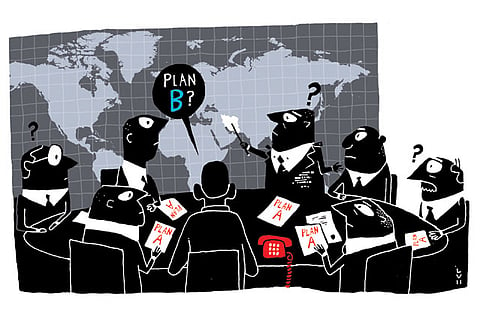World has no viable plan B to scuttle Iran's nuclear programme
Years of dialogue and sanctions have failed to produce results and military action seems a remote possibility

The new consensus, supported by strong intelligence reports, has it that there is "more time on the clock" before Iran develops the dreaded nuclear bomb.
US Defence Secretary Robert Gates declared last week that it is "time to exert more pressure without resorting to military threats". Hillary Clinton, the energetic US Secretary of State, in her second visit to the region in less than six weeks, also affirmed that "priority now is given to diplomacy". Both seem to be saying that bringing down Iran is finally possible without a military showdown.
All that is well and reassuring, but what if plan A — international pressure, tight economic sanctions, cyber sabotage, covert programmes and first and second round of talks to stop Iran from going nuclear — fail? What happens when the international community runs out of all the carrots and persuasions?
What is plan B? Sadly, the short answer is there is no viable plan B. According to General James Mattis, Commander of the US Central Command, "Plan B is simply more determination to see plan A work."
It is, of course, premature to abandon the ongoing build-up of pressure on Iran to quit enriching uranium. But realistically speaking, years of international pressure to isolate Iran are proving to be utterly fruitless. It is unlikely that the assertive Iran will ever heed to political pressure. Tehran values its independence and brushes away outside pressure as mere sabre-rattling by an increasingly impotent US.
Iran is also intoxicated by its numerous regional successes. It has a vast network of key allies and cronies all over the Middle East. Iran feels it is comfortably backed by global powers such as Russia and China and has secured strong sympathy for its nuclear programme from emerging regional powers such as India, Turkey and Brazil.
Similarly, sanctions are widely expected to fail. The ‘sanctions do not work' school of thought has been historically much more convincing than the ‘sanctions do work' school. Sanctions tend to empower hardliners and are invariably used by dictators and corrupt rulers to drum up support for the regime against foreign interference. Sanctions are symbolic and send a strong political message, but are hardly effective in changing policies or regimes.
Oil revenue
Nine months after the adoption of the 1929 UN resolution, the supposedly paralysing sanctions are not as paralysing. These sanctions are proving to be financially inconvenient, but not economically crippling since it does not include the oil export sector. Iran is the Organisation of Petroleum Exporting Countries' (Opec) second-largest exporter.
The price of oil is once again hovering above $90 and creeping up to $100. Iran's 2010 oil revenue was close to $70 billion which is an actual increase of nearly $20 billion over the 2009 figure. The prospect for 2011 is even better.
This is going to provide Iran with the necessary ‘comfort zone' it needs to undermine both the UN and US economic sanctions. Iran has also been chosen by Opec members for the organisation's 2011 presidency which undermines the international effort to isolate Iran.
This leaves the international community with the final component of plan A, namely, to engage, not enrage Iran. The emerging consensus seems to be that this is dialogue time, not confrontation time. Even the typically confrontational Iranian President Mahmoud Ahmadinejad declared that it is time for Iran to "move from confrontation to cooperation" to resolve international concerns over the nuclear issue. Recently, Tehran invited world powers to tour its nuclear sites in a goodwill gesture.
But ‘Talk to Iran', which is the current name of the game, is not yielding any positive results. The first round of talks in Geneva between Iran and the group of 5+1 were said to be "good but not good enough".
The verdict from last week's 15 hours of talks in Istanbul has been declared "disappointing". Worst yet, it is almost certain that there will not be a third round of negotiations anytime soon.
Deep inside, everyone knows that engaging the tough-negotiating Iran is not going to lead to any conclusive results. The chance for dialogue succeeding is near zero. Time and again, Iran used these closed door meetings to buy precious time to go ahead with its highly controversial enrichment programme. It is wishful thinking that dialogue by itself will halt Iran's 20-year drive for nuclear capability.
This fully brings us back to the nagging question, what is plan B? The message conveyed lately to Gulf Cooperation Council (GCC) capitals is forget military action. Plan B, succinctly stated is: accept nuclear Iran and try to adjust to its geopolitical fallout as a fait accompli.
This is one big nightmare that the GCC states are finding difficult to swallow. The bigger nightmare that the GCC has difficulty in digesting is that America, the frugal superpower, is no longer gutsy enough to cut off the head of the snake in the region.
Dr Abdulkhaleq Abdullah is professor of political science, Emirates University.



